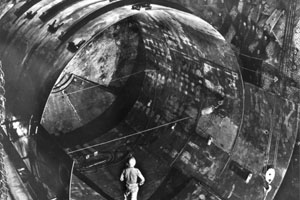Chicago cosmochemist Davis describes Nobelist father’s neutrino research on NOVA
By Steve KoppesNews Office
 This 1966 photo shows the construction of the tank used in the solar neutrino experiment in the Homestake gold mine. The tank, 20 feet in diameter and 48 feet long, held 100,000 gallons of perchloroetheylene and was located 4,900 feet below ground.  Ray Davis in 1999. | |
University cosmochemist Andrew Davis and physics alumnus John Bahcall were among the scientists appearing in a NOVA documentary about the neutrino, “The Ghost Particle,” which aired Tuesday, Feb. 21, on WTTW Channel 11. A transcript of the program will soon be available at http://www.pbs.org/wgbh/nova/neutrino/.
The program included an interview with Davis, Senior Scientist in Geophysical Sciences and the Enrico Fermi Institute, about the work that earned his father, Ray Davis Jr., the Nobel Prize in physics in 2002. Davis’ Nobel Prize cites him “for pioneering contributions to astrophysics, in particular the detection of cosmic neutrinos.”
Davis, 91, was the first scientist to detect solar neutrinos, which are produced in nuclear fusion reactions occurring deep within the sun’s core. Neutrinos are ghostly because they pass through solid matter at high speeds without slowing down.
Davis studied neutrinos in his Homestake Gold Mine experiment in South Dakota from 1967 to 1985. During that time, the experiment detected only one-third as many neutrinos as scientists had expected from their theories. Finally, in the 1990s, scientists concluded that the three known types of neutrinos could change from one form into another, accounting for the discrepancy.
Ray Davis and Bahcall received honorary degrees from the University in 2000. Two years later, Davis shared the physics Nobel with the University of Tokyo’s Masatoshi Koshiba, who was a Research Associate in the Fermi Institute’s cosmic-ray group from 1955 to 1958. Koshiba returned to the Institute in the Fall Quarter of 1989 as a Distinguished Visiting Professor.
Also interviewed for the program before his death in August 2005 was Bahcall, an astrophysicist at the Institute for Advanced Study in Princeton, N.J. Bahcall received his M.S. in physics from Chicago in 1957. He collaborated on neutrino research with Davis in the early 1960s.
Andrew Davis, who directs the Chicago Center for Cosmochemistry, studies meteorites to better understand the origin and early evolution of the sun and planets. He delivered the Nobel lecture in physics on behalf of his ailing father in Stockholm in December 2002.
![[Chronicle]](/images/sidebar_header_oct06.gif)